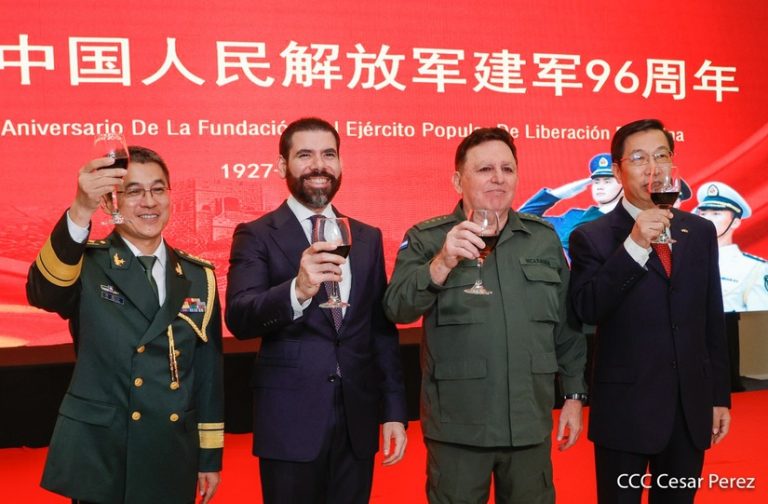8 de agosto 2023

“NicaraguAmor” Cultural Caravan for Nicaraguans in the USA

PUBLICIDAD 1M
PUBLICIDAD 4D
PUBLICIDAD 5D
Security and defense analyst Javier Melendez warns about “aggressive progress of the Chinese in takeover of communications in Honduras and Nicaragua"

De izq. a der.: El agregado de Defensa de China en Nicaragua, coronel superior Liu Zhaofeng; el hijo de la pareja presidencial Laureano Ortega Murillo; el general Julio César Avilés, jefe del Ejército nacional; y el embajador de China en Nicaragua, Chen Xi. Foto: Tomada de El 19 Digital
China will help consolidate the “autocratic regimes” in the Central American countries of El Salvador, Honduras, and Nicaragua, while in Costa Rica and Panama, they will maintain economic and trade relations, predicts Javier Melendez, a Nicaraguan security and defense analyst.
Melendez, who coordinates the activities of the Observatory on China in Central America, told EFE that “the model of China’s approach to Central America depends on the type of institutional framework” in each country.
“China’s interests and objectives in Panama and Costa Rica differ from the interests and objectives that China has in its relations with Honduras, El Salvador, and Nicaragua,” noted the expert in the context of a seminar called “Analyzing China’s influence in Central America,” organized in San Jose by the organization Expediente Abierto, which he leads, and the German Friedrich Naumann Foundation for Freedom.
For Melendez, with 25 years of experience in public safety, national defense, and organized crime issues in El Salvador, Honduras, and Nicaragua, “what we have seen is an open action by China to consolidate these regimes to increase the anti-Western narrative and stress that the Chinese model is more viable for these autocrats.”
He asserted that in its diplomatic relations with third countries, China “does not require transparency, democracy or human rights, which are completely minimized or barely touched on.”
“For the Chinese, this type of relation with these types of autocrats is the ideal to which they can strive in Central America,” he emphasized.
He noted that through the leaders of those three countries, mainly Sandinista Daniel Ortega in Nicaragua, and Xiomara Castro, in Honduras, China “could find a kind of clientelism or complicity” to “disseminate the Chinese narrative” in the West as the model of success in the new world order.
“In Nicaragua, Honduras, and El Salvador, China has three partners that could help it disseminate and make more visible its ideas about ending US influence or hegemony in the region,” he remarked.
Melendez, who was also stripped of his nationality by the Ortega regime and lives in the United States, expressed his concern about “the aggressive progress of the Chinese in the takeover of telecommunications in Honduras and Nicaragua.”
“We are following up on the agreements that the Hondurans are making with Chinese state agencies and the prospective alliance that could be made with Huawei, which would imply that we would again have a scenario like in Nicaragua, in which the Chinese have access to most data of the citizens in those countries,” he warned.”
“We are concerned because we have learned of experiences in Panama, Ecuador, and Bolivia, where the Chinese have used user information to propose models of brutal persecution and surveillance under the pretext of improving security monitoring. However, it became clear in those experiences that it ended up being used for political espionage of civil society, renowned journalists, among others,” he argued.
Thus, according to Melendez, China will advance in Central America “as far as each country that hosts it will let them.”
Last March, Honduras joined Costa Rica (2007), Panama (2017), El Salvador (2018), and Nicaragua (2021), which broke their relations with Taiwan in favor of the People’s Republic of China.
This article was originally published in Spanish in Confidencial and translated by Havana Times.
PUBLICIDAD 3M
Agencia de noticias internacional con sede en Madrid, España. Fundada en Burgos durante la guerra civil española en enero de 1939.
PUBLICIDAD 3D